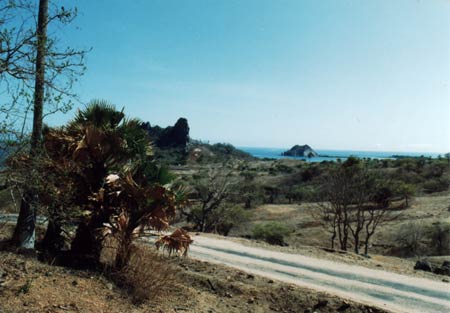|
Roti CD |
A Soundscape from Roti, Indonesia
This is an excerpt from a soundscape montage included on the CD Troubled Grass and Crying Bamboo: The Music of Roti; it is composed of six parts:
The Sea - Roti is a small island and the li tasi oe - meaning both the sound and the waves of the sea - is always near by. Symbolically, the sea is the birthplace of Rotinese culture, and mythological narratives describe how fire, cooked food, weaving and bridewealth all originated there.
Dawn - Roosters, crickets and lizards, the key sounds of early morning in a Rotinese village.
Circle Dance - Performed by the people of Oebou led by Jonas Moi. The Rotinese circle dance is led by a chanter (manahelo) answered by the other dancers in chorus. The participants, including men, women and children, form a circle by holding one another's elbows, and perform dance steps which cause the circle to turn slowly to their right. The short excerpt here is taken from the opening minutes of an evening-long circle dance, and the text is comprised of introductory phrases urging the participants to gather as one and join in the dance.
Night - The voice of a gecko, crickets, lizards and distant howling dogs are the main elements in this late night soundscape.
Troubled Grass and Crying Bamboo - Told by Johannes Mesak. An excerpt from the conclusion of a mythological narrative about the origin of sasandu-accompanied song and the origin of death. With the first death the Rotinese come to know sorrow and weeping for the first time, and express their sorrow through the sasandu. The poet evokes the overwhelming despair that inspires the sasandu players by comparing the rocking of the mourners to the swaying of the troubled tall grass, and their weeping to the eerie crying of the wind in a bamboo grove.
The Sea - A return to the li tasi oe.
Recordings by Christopher Basile.
